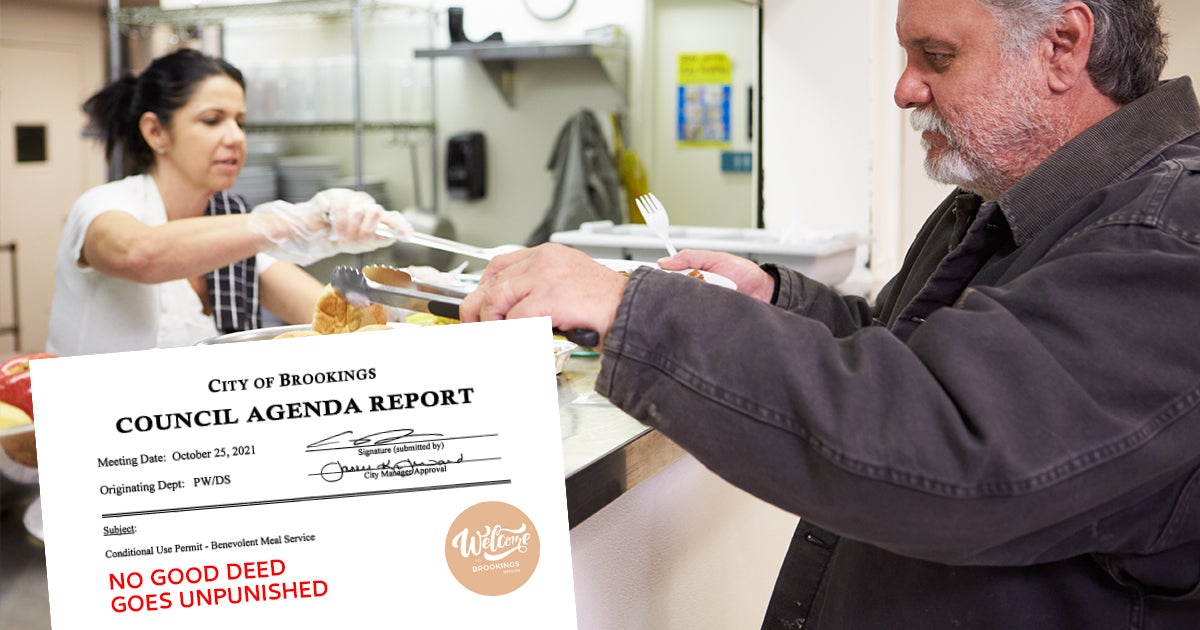
by Jorge Gomez • 7 min read
Far too often, religious organizations serving vulnerable communities—particularly the homeless—are targeted by the radical Left and government officials simply because of their religious character.
St. Timothy’s Episcopal Church in Brookings, Oregon recently filed a lawsuit in federal court challenging a local city ordinance that restricts the church’s meal program for the homeless, claiming it violates its right to religious freedom.
The church has been serving meals four days a week, Friday through Monday, so that in conjunction with other nearby houses of worship offering similar assistance programs, people can have access to at least one hot meal every day of the week. But the city ordinance limits the church to offering free meals just twice a week.
The Brookings City Council approved the ordinance last October after complaints from residents who live near churches that have meal ministries. The church is asking the federal court to declare the ordinance invalid, seeking a permanent injunction to stop the city from enforcing the measure.
Sadly, this is just one example of government officials harassing religious organizations. So pervasive is the harassment toward religious homeless outreach ministries that a case is currently pending at the U.S. Supreme Court.
First Liberty filed a friend-of-the-court brief at the Supreme Court on behalf of just such a ministry: Seattle’s Union Gospel Mission. It provides necessities, such as food and shelter and assists with addiction recovery, job placement and legal services.
But the Mission was sued by attorney Matthew Woods after it declined to hire him because he doesn’t share or live according to the ministry’s Christian beliefs about marriage and sexuality.
Remarkably, the Washington State Supreme Court ruled against the Mission, concluding that it is required by law to hire someone who doesn’t share or live according to the ministry’s beliefs. Under this opinion, the state can actually require houses of worship and religious non-profits to hire people expressly opposed to their mission.
Our brief urges the nation’s highest court to take the case and make clear that the First Amendment protects the fundamental right of religious ministries to hire people who share the same religious beliefs.
A Proven Record: Helping Faith-Based Ministries Be a Light to Those in Need
The Supreme Court has not yet announced whether it will hear Seattle’s Union Gospel Mission v. Woods. But while we wait on a response from the nation’s highest court, let’s look at how First Liberty is fighting to protect religious organizations seeking to care for the homeless.
In Tallahassee, Florida, one faith-based homeless ministry—City Walk Urban Mission—stayed open, even expanding beyond its intended mission as a transitional housing facility, to provide temporary access to the general homeless population after the city pleaded for help. But when neighbors complained about an increase in the homeless in the area, the City reversed course, began fining City Walk for violating local zoning laws and then denied the ministry’s zoning application.
In other words, the city is using a problem it created to deny City Walk the freedom to actually help the homeless. The city was happy to drop off the homeless on City Walk’s doorstep during a crisis, but now opposes City Walk’s effort to reduce the number of homeless in the community. First Liberty is fighting on behalf of City Walk to reverse this wrong.
In Dallas, Texas, First Liberty won an important victory just last year on behalf of OurCalling, a church and nonprofit ministry that provides various homeless services. OurCalling partners closely with city agencies, as well as healthcare providers and other charities. Because of its religious beliefs, OurCalling remains open 24-hours as a last resort during emergencies if homeless people have nowhere else to go.
But in 2018, Dallas ticketed OurCalling for keeping its doors open during dangerously cold weather. Then, when the Dallas city council created a permitting program to allow churches to provide temporary shelter in inclement weather, some on the city council added a buffer zone that excluded OurCalling from participating. After working with attorneys at First Liberty, the city reversed course and allowed OurCalling to continue its important work.
A few years ago, the Downtown Hope Center, a religiously affiliated women’s homeless shelter in Anchorage, Alaska was accused by the Anchorage Equal Rights Commission of violating the city’s non-discrimination policy by preventing a biological male self-identifying as female from residing at the facility. First Liberty successfully defended an attorney who defended the ministry and had been charged with discrimination for doing so.
Most recently, the Center filed a federal lawsuit against a city ordinance that forces it to admit biological males who say they identify as female and let them sleep alongside women who have suffered physical and sexual abuse. The ordinance also prohibits the Center from communicating about its religious beliefs on its website and signs posted around its facility.
As these cases demonstrate, religious organizations do essential work to care for vulnerable communities. Yet, the government is often quick to take aim at those ministries simply because of their religious beliefs.
With your support, First Liberty will continue to fight for religious organizations to ensure they can continue their divinely-inspired mission to serve the neediest among us.